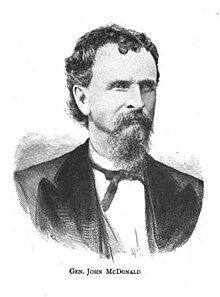
Ulysses S. Grant was the 18th president of the United States, serving from 1869 to 1877. As commanding general, Grant led the Union Army to victory in the American Civil War in 1865.
In the United States, a special counsel is a lawyer appointed to investigate, and potentially prosecute, a particular case of suspected wrongdoing for which a conflict of interest exists for the usual prosecuting authority. Other jurisdictions have similar systems. For example, the investigation of an allegation against a sitting president or attorney general might be handled by a special prosecutor rather than by an ordinary prosecutor who would otherwise be in the position of investigating his or her own superior. Special prosecutors also have handled investigations into those connected to the government but not in a position of direct authority over the Justice Department's prosecutors, such as cabinet secretaries or election campaigns.
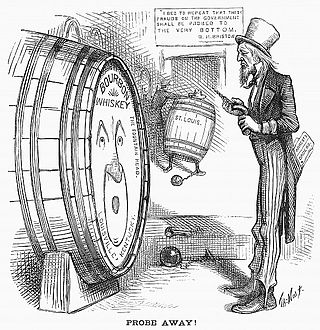
The Whiskey Ring took place from 1871 to 1876 centering in St. Louis during the presidency of Ulysses S. Grant. The ring was an American scandal, broken in May 1875, involving the diversion of tax revenues in a conspiracy among government agents, politicians, whiskey distillers, and distributors. Whiskey distillers bribed officials from the U. S. Department of the Treasury to increase profits and evade taxes. Grant's Justice Department prosecuted members of Grant's own Republican Party who were part of the Ring. The kingpin of the Whiskey Ring was the notorious General John McDonald, whom Grant had appointed Revenue Collector of Missouri District in 1869. Under the leadership of Grant's Secretary of Treasury, Benjamin Bristow, a reformer, the Ring was uncovered and broken up.

Benjamin Helm Bristow was an American lawyer and politician who served as the 30th U.S. Treasury Secretary and the first Solicitor General.
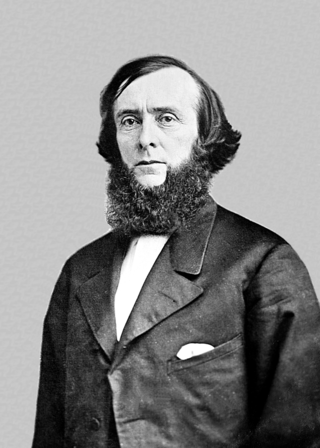
Edwards Pierrepont was an American attorney, reformer, jurist, traveler, New York U.S. Attorney, U.S. Attorney General, U.S. Minister to England, and orator. Having graduated from Yale in 1837, Pierrepont studied law and was admitted to the bar in 1840. During the American Civil War, Pierrepont was a Democrat, although he supported President Abraham Lincoln. Pierrepont initially supported President Andrew Johnson's conservative Reconstruction efforts having opposed the Radical Republicans. In both 1868 and 1872, Pierrepont supported Ulysses S. Grant for president. For his support, President Grant appointed Pierrepont United States Attorney in 1869. In 1871, Pierrepont gained the reputation as a solid reformer, having joined New York's Committee of Seventy that shut down Boss Tweed's corrupt Tammany Hall. In 1872, Pierrepont modified his views on Reconstruction and stated that African American freedman's rights needed to be protected.

Columbus Delano was an American lawyer, rancher, banker, statesman, and a member of the prominent Delano family. Forced to live on his own at an early age, Delano struggled to become a self-made man. Delano was elected U.S. Congressman from Ohio, serving two full terms and one partial one. Prior to the American Civil War, Delano was a National Republican and then a Whig; as a Whig, he was identified with the faction of the party that opposed the spread of slavery into the Western territories. He became a Republican when the party was founded as the major anti-slavery party after the demise of the Whigs in the 1850s. During Reconstruction Delano advocated federal protection of African-Americans' civil rights, and argued that the former Confederate states should be administered by the federal government, but not as part of the United States until they met the requirements for readmission to the Union.
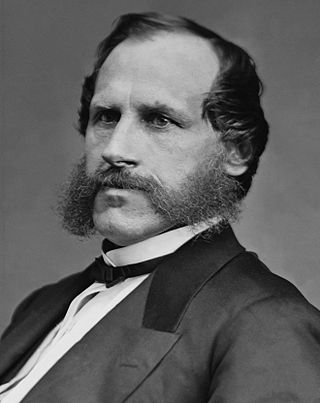
George Henry Williams was an American judge and politician. He served as chief justice of the Oregon Supreme Court, was the 32nd Attorney General of the United States, and was elected Oregon's U.S. senator, and served one term. Williams, as U.S. senator, authored and supported legislation that allowed the U.S. military to be deployed in Reconstruction of the southern states to allow for an orderly process of re-admittance into the United States. Williams was the first presidential Cabinet member to be appointed from the Pacific Coast. As attorney general under President Ulysses S. Grant, Williams continued the prosecutions that shut down the Ku Klux Klan. He had to contend with controversial election disputes in Reconstructed southern states. President Grant and Williams legally recognized P. B. S. Pinchback as the first African American state governor. Williams ruled that the Virginius, a gun-running ship delivering men and munitions to Cuban revolutionaries, which was captured by Spain during the Virginius Affair, did not have the right to bear the U.S. flag. However, he also argued that Spain did not have the right to execute American crew members. Nominated for Supreme Court Chief Justice by President Grant, Williams failed to be confirmed by the U.S. Senate primarily due to Williams's opposition to U.S. Attorney A. C. Gibbs, his former law partner, who refused to stop investigating Republican fraud in the special congressional election that resulted in a victory for Democrat James Nesmith.
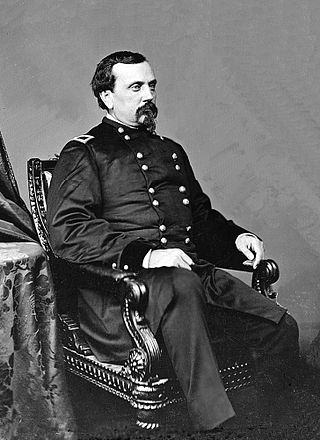
Orville Elias Babcock was an American engineer and general in the Union Army during the Civil War. An aide to General Ulysses S. Grant during and after the war, he was President Grant's military private secretary at the White House, Superintendent of Buildings and Grounds for Washington D.C., and a Florida-based federal inspector of lighthouses. Babcock continued to serve as lighthouse inspector under Grant's successors Rutherford B. Hayes, James A. Garfield, and Chester A. Arthur.

Isaac Charles Parker, also known as "Hanging Judge" Parker, was an American politician and jurist. He served as a United States representative (congressman) in two separate districts subsequently from Missouri and was appointed as the first United States district judge of the United States District Court for the Western District of Arkansas, which also had jurisdiction over the adjacent Indian Territory to the west. He was appointed by 18th President Ulysses S. Grant in 1875 and served in the federal judiciary until his death in 1896.

John Brooks Henderson was an American attorney and politician who represented Missouri in the United States Senate from 1862 to 1869.

David Carruthers is a British businessman who was the CEO of online gambling company BETonSPORTS plc from July 2000 until July 2006. He was arrested in the United States on 16 July 2006 on charges related to his role as CEO of the company. He was subsequently convicted of racketeering conspiracy, and sentenced to 33 months in prison.

Ulysses S. Grant and his administration, including his cabinet, suffered many scandals, leading to a continuous reshuffling of officials. Grant, ever trusting of his chosen associates, had strong bonds of loyalty to those he considered friends. Grant was influenced by political forces of both reform and corruption. The standards in many of his appointments were low, and charges of corruption were widespread. At times, however, Grant appointed various cabinet members who helped clean up the executive corruption. Starting with the Black Friday (1869) gold speculation ring, corruption would be discovered in seven federal departments. The Liberal Republicans, a political reform faction that bolted from the Republican Party in 1871, attempted to defeat Grant for a second term in office, but the effort failed. Taking over the House in 1875, the Democratic Party had more success in investigating, rooting out, and exposing corruption in the Grant Administration. Nepotism, although legally unrestricted at the time, was prevalent, with over 40 family members benefiting from government appointments and employment. In 1872, Senator Charles Sumner, labeled corruption in the Grant administration "Grantism."

The presidency of Ulysses S. Grant began on March 4, 1869, when Ulysses S. Grant was inaugurated as the 18th President of the United States, and ended on March 4, 1877. The Reconstruction era took place during Grant's two terms of office. The Ku Klux Klan caused widespread violence throughout the South against African Americans. By 1870, all former Confederate states had been readmitted into the United States and were represented in Congress; however, Democrats and former slave owners refused to accept that freedmen were citizens who were granted suffrage by the Fifteenth Amendment, which prompted Congress to pass three Force Acts to allow the federal government to intervene when states failed to protect former slaves' rights. Following an escalation of Klan violence in the late 1860s, Grant and his attorney general, Amos T. Akerman, head of the newly created Department of Justice, began a crackdown on Klan activity in the South, starting in South Carolina, where Grant sent federal troops to capture Klan members. This led the Klan to demobilize and helped ensure fair elections in 1872. He was succeeded by fellow Republican Rutherford B. Hayes, who won the 1876 presidential election.
The history of St. Louis, Missouri, from 1866 to 1904 was marked by rapid growth. Its population increased, making it the country's fourth-largest city after New York City, Philadelphia, and Chicago. It also saw rapid development of heavy industry, infrastructure, and transportation. The period culminated with the city's hosting of the 1904 World's Fair and 1904 Summer Olympics.

Lewis E. Reed is a former American politician from St. Louis, Missouri. His last position was president of its Board of Aldermen which he held for a record duration of 15 years. He was federally indicted on bribery charges in May 2022 and resigned his at large board position in June.

During Ulysses S. Grant's two terms as president of the United States (1869–1877) there were several executive branch investigations, prosecutions, and reforms carried-out by President Grant, Congress, and several members of his cabinet, in the wake of several revelations of fraudulent activities within the administration. Grant's cabinet fluctuated between talented individuals or reformers and those involved with political patronage or party corruption. Some notable reforming cabinet members were persons who had outstanding abilities and made many positive contributions to the administration. These reformers resisted the Republican Party's demands for patronage to select efficient civil servants. Although Grant traditionally is known for his administration scandals, more credit has been given to him for his appointment of reformers.
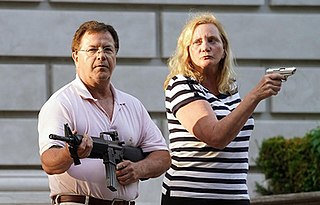
On June 28, 2020, during the George Floyd protests in St. Louis, Missouri, Patricia and Mark McCloskey pointed firearms and yelled at protesters marching through the private neighborhood they co-owned. Some protesters yelled back. The incident gained national news coverage and sparked controversy.
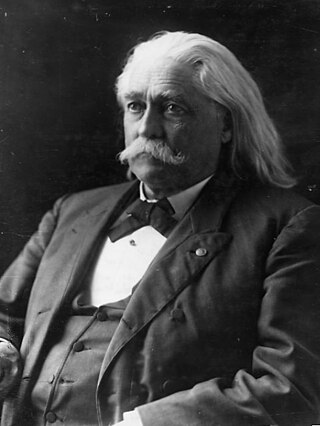
John Alexander Joyce was an Irish–American poet and writer. He served as a first lieutenant and regimental adjutant in the Union Army. He was indicted for his role as Internal Revenue Service agent in the Whiskey Ring.
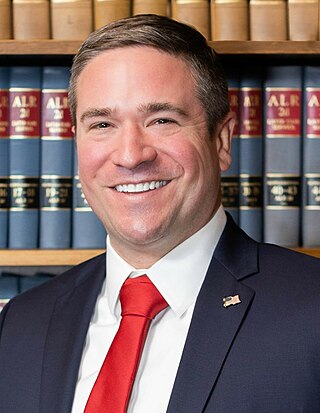
Andrew Bailey is an American attorney and politician. A Republican, he has served as Missouri Attorney General since he was appointed by Governor Mike Parson in January 2023.
